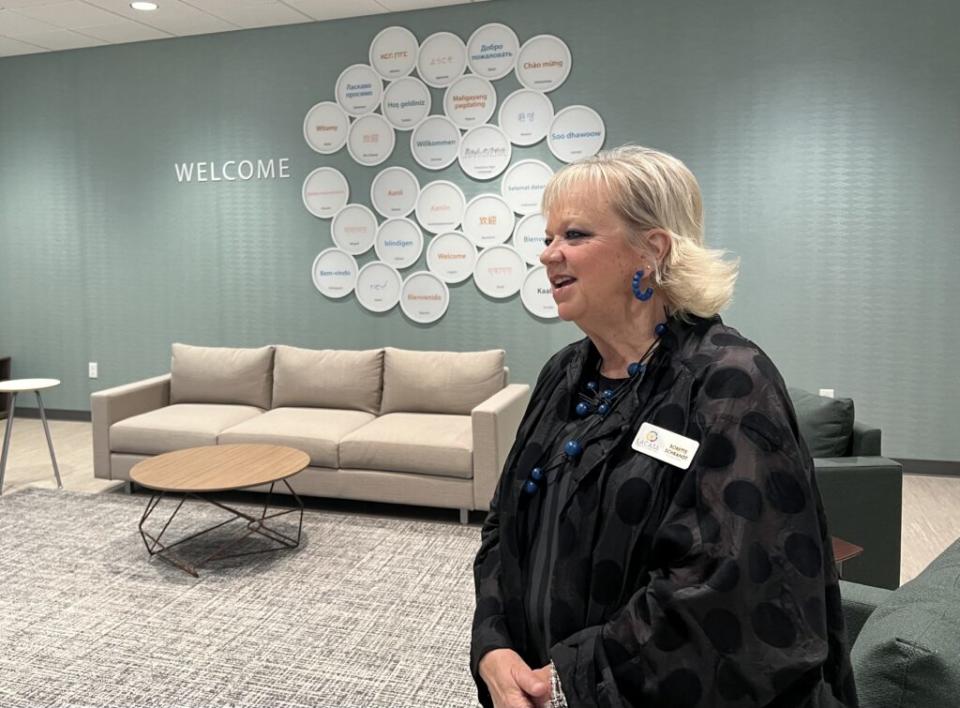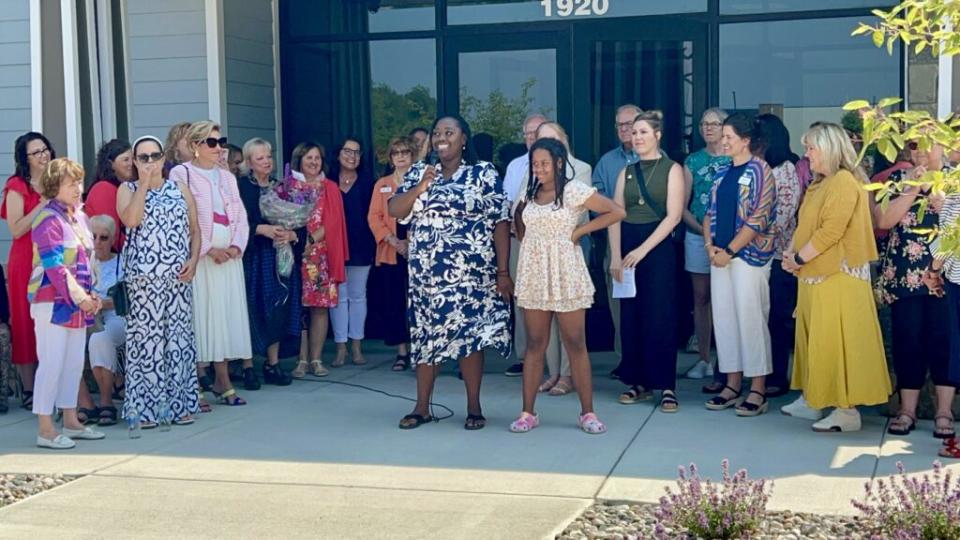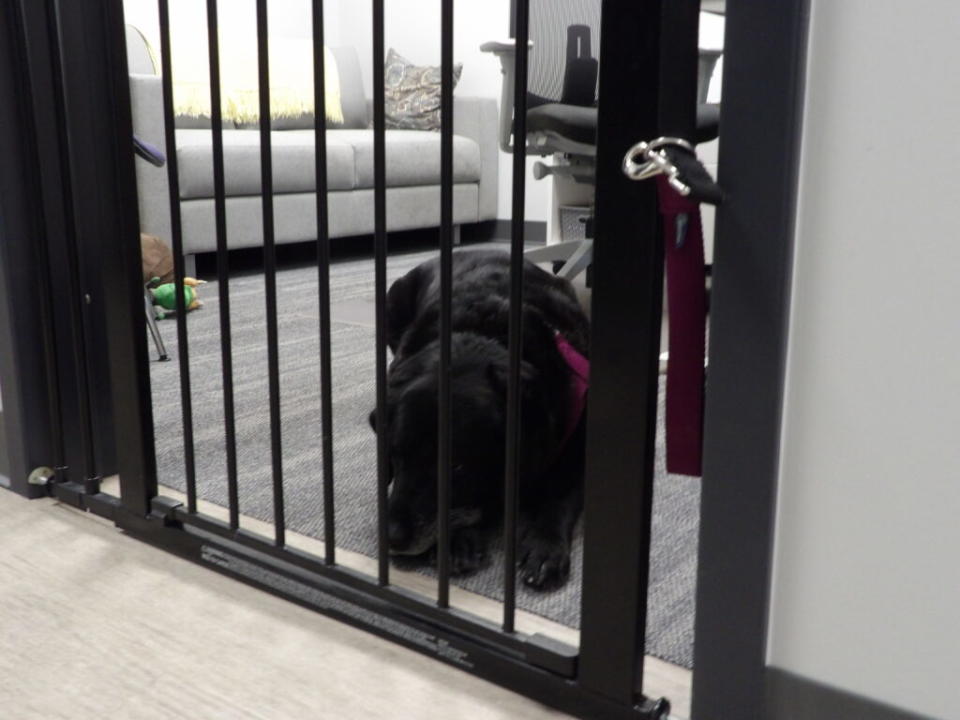New $15M Livingston Co. domestic violence shelter is already at capacity
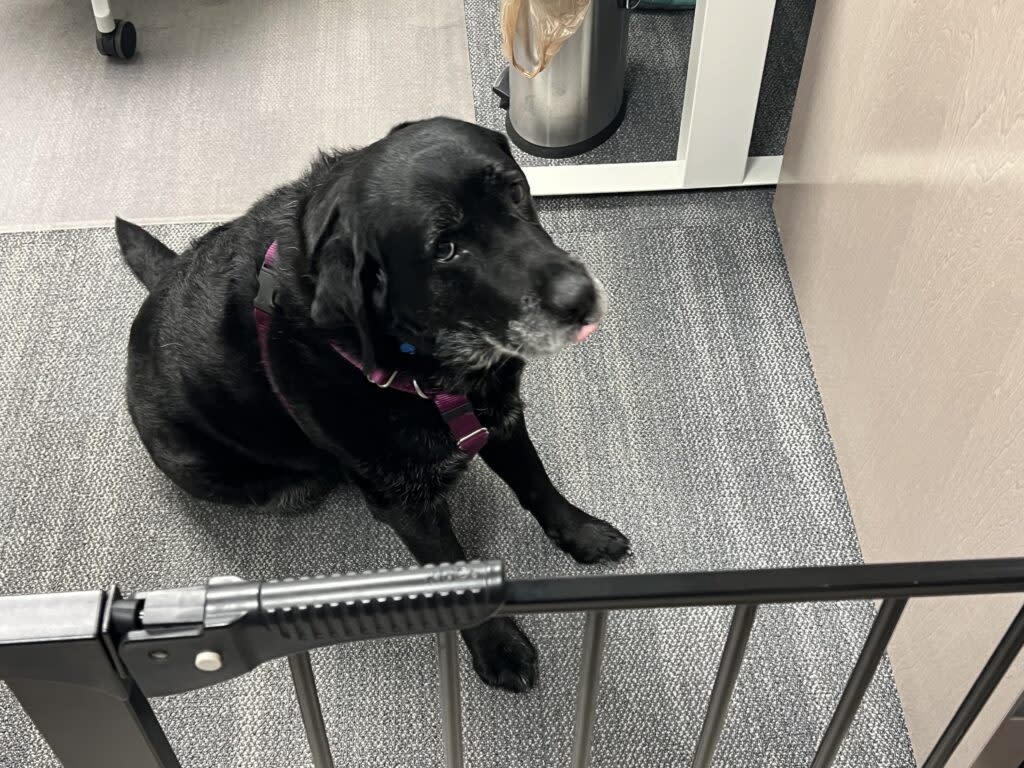
LACASA's advocacy dog Penny. June 17, 2024. Photo by Jon King
Domestic violence care providers called attention to heightened danger for those experiencing abuse during the height of the COVID-19 pandemic, as individuals spent more time at home with their abusers and access to resources was strained. This Michigan Advance series aims to shed light on the hurdles victims of domestic violence and care providers are facing now.
What began in 1979 with $40 in donations and volunteers offering up their homes to shelter women and their children in crisis has blossomed, 45 years later, into a 56-bed state-of-the-art crisis shelter, including a therapeutic playground, nationally accredited Children’s Advocacy Center, Sexual Assault Nurse Examiner (SANE) room, and multiple counseling areas.
A ribbon-cutting Monday in Howell marked a new era for LACASA, a Livingston County-based nonprofit dedicated to supporting victims and survivors of child abuse, domestic violence and sexual violence.
“What you’ll see is a space that was created with intentionality,” said LACASA President and CEO Bobette Schrandt. “Every design choice, every facet was chosen for a reason. It was grounded in evidence-based and good practices and trauma-informed, and it guides all our critical work that we do here within these walls. We also intentionally chose a place where we could have room to grow.”
And that extra room may be needed sooner, rather than later, as the new facility is already at capacity.
“Remember the line in the famous movie, ‘Field of Dreams’: ‘If you build it, they will come?’ Well, believe me, we built it and they came. We have been full every day since we opened our doors Jan. 10,” she said.
As the Advance has reported, experts have drawn attention to domestic violence during the COVID-19 pandemic, when many victims were trapped at home with their abusers for long periods of time, prompting some to call the phenomenon a “dual pandemic.” Now advocates say they’re concerned that domestic violence is also getting more deadly in Michigan.
“The abuse has gotten more lethal and more cruel,” said Mechelle Donahoo, director of victim services for the Wayne County Prosecutor’s Office, told the Advance in October.
Schrandt says the upgrade has allowed the organization to bring all of their clients under one roof. Previously, staff needed to place the overflow in area hotels, which was anywhere between five and nine families a month, costing the organization about $50,000 annually over the past several years.
“We had people in hotels for more than a year,” she said, noting one case in which a mother with five children had to share a single hotel room with just two beds.
The new facility now has multiple rooms for larger families, including those with an adjoining door.
LACASA raised $12 million that facilitated the construction and move-in of the building, with the ribbon cutting marking the start of a final fundraising phase to generate an additional $3 million that would complete and fully furnish the facility.
The new building, which officials say boasts upgraded security and technology, has not only doubled their shelter capacity, but now also houses all their outreach, counseling and legal advocacy programs, Children’s Advocacy Center, and administrative offices in a single location, making it the only facility in Michigan serving victims of interpersonal violence to offer a full suite services, including adult counseling, under one roof.
“When they say it takes a village, it truly does take a village, and for me LACASA was my village,” said Marlowe, a former client who spoke about her experience just prior to the ribbon-cutting. “Not even being a resident at the time in Livingston County, all the shelters in Oakland County were full. I had been in 10 years of abuse in a really bad relationship, and I had tried to leave time and time again. Coming to LACASA was life changing.”
Marlowe, whose last name was not released by LACASA, said the nonprofit did more than just shelter her and her daughter, they also gave her the time and resources to get her life back on track.
“The only thing that ended the support was me, because I had got to a point where they had supported me so much that I was able to get to the next level,” she said.
Marlowe said it wasn’t an understatement to say LACASA had saved her life.
“I’m not even quite sure I would be standing here talking to you today if I hadn’t come to LACASA. So I’m truly grateful,” she said.
A safe place for pets
One of the ways LACASA helps to make the decision to leave an abusive situation less stressful is by going above and beyond to accommodate pets, something it has done since 2001.
“That is critical,” Schrandt said. “We never want somebody not to leave a violent situation because of their animals. So all of our [clients] can have animals right in their bedroom.”
Schrandt says for many years, LACASA was the only domestic violence shelter in Michigan that allowed pets, but that has changed as people see the benefit it provides, not only to their clients, but to the animals.
“We have animals that have come in here, ears cut off, tail cut off. One of the most common is burnt paws,” she said, adding that most of their veterinary services are donated.
Dogs and cats aren’t the only animals that have made their home at LACASA over the years.
“We’ve had goats, we’ve had bearded dragons, we’ve had snakes, rabbits, birds, you name it,” said Schrandt, “Turtles, guinea pigs, and more recently, it’s amazing, we had a chicken, a support chicken. I was like, ‘A chicken? OK.’”
One animal who pretty much calls LACASA home is Penny, the organization’s full-time advocacy dog.
“We are the only ones in the state that own our own advocacy dog,” said Schrandt, who says Penny has proven invaluable in helping kids when they have to either participate in a forensic interview, or even potentially go to court if they need to testify.
Improved facilities for child abuse and sexual assault survivors
The new facility has allowed for better capabilities with forensic interviews, also known as CARE (Child Abuse Response Effort) interviews, in which child abuse victims are interviewed in one room with a trained counselor, while law enforcement and other officials can observe in an adjoining room through a one-way mirror.
Schrandt says in their previous facility, space constraints meant that the waiting area for non-offending parents or guardians was located right next to the lobby, which made privacy difficult. The new facility was designed specifically so that participants could come in through a separate entrance. Overall, she says the goal is to reduce the strain on child victims and ensure law enforcement can get accurate information.
“This is an evidence-based model where the child only gets interviewed once, not five different times,” said Schrandt, who used to be a child protective service worker in Wayne County. “One time, everyone hears the same story. Typically, the perpetrator will plead, and the child will not have to go to court. That’s always our goal. So little ones don’t have to go to court.”
Another vital service that LACASA was already providing, but can now do much more efficiently in the new facility, is allowing for victims of sexual assault to be examined by a medical professional through the SANE (Sexual Assault Nurse Examiner) program which allows them to avoid a trip to the emergency room.
Remember the line in the famous movie, ‘Field of Dreams’: ‘If you build it, they will come?’ Well, believe me, we built it and they came. We have been full every day since we opened our doors Jan. 10.
– LACASA President and CEO Bobette Schrandt
“When you go to a hospital, you walk in, you go to triage. So you’re telling somebody your story. Then you go and sit and wait in a lobby with a bunch of other people that could be your neighbor, and a police officer more than likely walked you in. Not the best. And then you go to a room, you tell the nurse what happened, then you tell the doctor. So you’re doing the same thing with kids, you’re retraumatizing them each time,” said Schrandt.
The SANE program allows victims to come directly to LACASA where they now have separate adult and pediatric exam rooms, staffed by nurses trained specifically in both the collection of evidence and how to best treat assault patients.
“We do children and adults, not everyone does children,” says Schrandt. “Our nurses are cross-trained so that children don’t have to go to [the University of Michigan Hospital in Ann Arbor], which is where they used to go. And when they went there, they weren’t going because families don’t have to take them. A child is dependent on their parent, so it’s up to the parent, and the parents weren’t taking them because it’s so far.”
Schrandt says the organization has five SANE nurses who are on-call 24 hours, seven days a week, with a nurse manager who supervises the program.
“They’re certified through the International Forensic Nursing Program, which they go through strict training,” says Schrandt, who added that the nurses are specially trained to spot signs of strangulation, something that they have seen an increasing amount of in recent years, as have other agencies across the state.
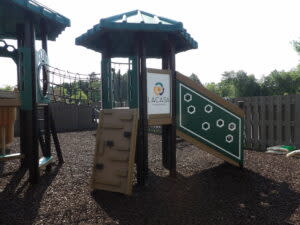
Therapeutic playground at LACASA's new $15 million domestic violence shelter and facility. June 17, 2024. Photo by Jon King
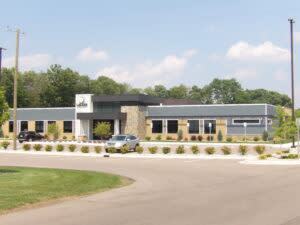
LACASA's new $15 million domestic violence shelter and facility. June 17, 2024. Photo by Jon King

LACASA's new $15 million domestic violence shelter and facility. June 17, 2024. Photo by Jon King
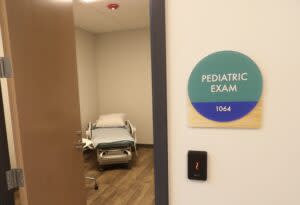
Exam room for pediatric victims of sexual assault at LACASA's new $15 million domestic violence shelter and facility. June 17, 2024. Photo by Jon King
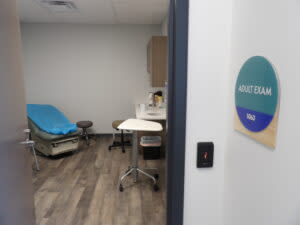
Exam room for adult victims of sexual assault at LACASA's new $15 million domestic violence shelter and facility. June 17, 2024. Photo by Jon King

Client dining area at LACASA's new $15 million domestic violence shelter and facility. June 17, 2024. Photo by Jon King
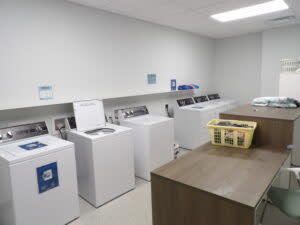
Laundry room for shelter clients at LACASA's new $15 million domestic violence shelter and facility. June 17, 2024. Photo by Jon King
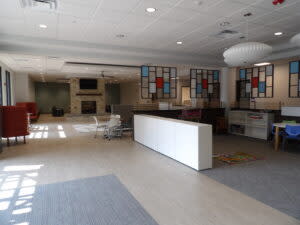
Client living area at LACASA's new $15 million domestic violence shelter and facility. June 17, 2024. Photo by Jon King

LACASA President & CEO Bobette Schrandt (at left in blue) and LACASA board chair Pat Claffey (at right in orange), cut the ribbon on the organization's new $15 million domestic violence shelter and facility. June 17, 2024. Photo by Jon King
“Strangulation is something that we know there’s a great deal of damage that can happen that doesn’t always have signs,” she said. “However, there are other signs … in the eyes, the mouth, ears. It’s surprising what can be determined from strangulation. So our nurses went through some special training, and we received a grant from Trinity Health here in Livingston [County], and we were able to get more in-depth training and provide strangulation exams because that is not covered by anyone.”
One thing Schrandt pointed to as being a stereotype that seems to live on despite evidence to the contrary is that domestic violence, whether it be through physical or sexual abuse, is somehow lesser of a problem in a relatively affluent community like Livingston County, which lies between Lansing and Detroit and is often ranked as one of the wealthiest in the state.
“Domestic violence and sexual assault does not know socioeconomic levels or race or anything like that. It does not. We see it all,” said Schrandt, who reemphasized that point to the crowd of more than 100 local officials and residents who gathered for the ribbon-cutting.
“A big part of what we do is raising awareness of interpersonal violence and awareness of our services,” she said. “And the more we push that out, the more sunlight we will put on an issue that has too far been covered up in darkness.”
If you need help
Michigan Domestic Violence Hotline (1-866-864-2338)
National Domestic Violence Hotline (1-800-799-7233)
StrongHearts Native Helpline (1-844-762-8483)
GET THE MORNING HEADLINES DELIVERED TO YOUR INBOX
The post New $15M Livingston Co. domestic violence shelter is already at capacity appeared first on Michigan Advance.

